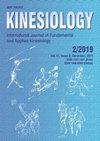Influence of schoolbag carriage on pattern changes in plantar pressure during walking among first-grade schoolchildren
IF 0.9
4区 医学
Q4 REHABILITATION
引用次数: 6
Abstract
The aim of this study was to determine the influence of the schoolbag carriage on pattern changes in plantar pressure during walking among schoolchildren in the first grade. The sample consisted of 127 schoolchildren, 48.8% male (N = 62) and 51.2% female (N = 65), with a mean age of 6.7 (± 0.5) years. The mean schoolbag weight was 4.2 kg (± 0.7), which represented a 16.9% (± 3.9) of the body weight, thus exceeds the upper limit of 15% of the body weight and can affect the posture by a general way. This study has shown a statistically significant influence of the school bag on changes in plantar pressure pattern when walking in relation to walking without the schoolbag. Using a t-test for large dependent samples and by setting statistical significance at p ≤ 0.05, a significant increase was noticed in peak pressure for the forefoot (p = .000; 17.1%), midfoot (p = .000; 5.7%) and the hindfoot (p = .004; 3.9%) as well as in average pressure for the midfoot (p = .005; 6.2%). Also, due to the compensatory mechanisms, while carrying the bag, a statistically significant increase in the contact surface at the forefoot (p = .000; 3.6%) and the midfoot (p =. 000, 8.8%) occurs. Changes in the distribution of pressure between the different parts of the foot are a source of potential foot problems which is why the results of this study have a high applicability in the prevention of foot pathology in the future.书包搬运对一年级小学生行走时足底压力模式变化的影响
本研究的目的是确定书包搬运对一年级小学生行走过程中足底压力模式变化的影响。样本包括127名学童,其中48.8%为男性(N=62),51.2%为女性(N=65),平均年龄6.7(±0.5)岁。书包的平均重量为4.2公斤(±0.7),占体重的16.9%(±3.9),因此超过了体重15%的上限,并会对姿势产生一般影响。这项研究表明,与不带书包走路相比,书包对走路时足底压力模式变化的影响具有统计学意义。通过对大的依赖样本进行t检验,并将统计学显著性设置为p≤0.05,注意到前掌(p=.000;17.1%)、足中部(p=0.000;5.7%)和后脚(p=.004;3.9%)的峰值压力以及足中部的平均压力(p=0.005;6.2%)显著增加,前脚(p=.000;3.6%)和足中部(p=0.000,8.8%)的接触表面出现统计学上显著的增加。足部不同部位之间压力分布的变化是潜在足部问题的来源,这就是为什么这项研究的结果在未来预防足部病理学方面具有很高的适用性。
本文章由计算机程序翻译,如有差异,请以英文原文为准。
求助全文
约1分钟内获得全文
求助全文
来源期刊

Kinesiology
REHABILITATION-SPORT SCIENCES
CiteScore
1.90
自引率
8.30%
发文量
16
审稿时长
>12 weeks
期刊介绍:
Kinesiology – International Journal of Fundamental and Applied Kinesiology (print ISSN 1331- 1441, online ISSN 1848-638X) publishes twice a year scientific papers and other written material from kinesiology (a scientific discipline which investigates art and science of human movement; in the meaning and scope close to the idiom “sport sciences”) and other adjacent human sciences focused on sport and exercise, primarily from anthropology (biological and cultural alike), medicine, sociology, psychology, natural sciences and mathematics applied to sport in its broadest sense, history, and others. Contributions of high scientific interest, including also results of theoretical analyses and their practical application in physical education, sport, physical recreation and kinesitherapy, are accepted for publication. The following sections define the scope of the journal: Sport and sports activities, Physical education, Recreation/leisure, Kinesiological anthropology, Training methods, Biology of sport and exercise, Sports medicine and physiology of sport, Biomechanics, History of sport and Book reviews with news.
 求助内容:
求助内容: 应助结果提醒方式:
应助结果提醒方式:


